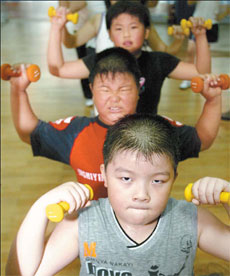| Home / Health / Photo | Tools: Save | Print | E-mail | Most Read |
| Battle of the Bulge |
| Adjust font size: |
Ten-year-old Chang Tai is always hungry. The little fellow particularly enjoys wolfing down pork, chicken legs, and hamburgers. He already weighs 50 kilograms, almost 15 kilograms heavier than most boys of his age and height, and his weight problem is shattering his confidence. During Physical Education lessons he always finishes last in running and jumping races. He says fellow students frequently jeer him in the schoolyard and even adults turn their heads when he walks down the street. Young Chang is not alone. Obesity has become a rapidly growing social and medical problem across China, especially in the cities, and groundbreaking research has revealed that overeating is not the only cause.
Guo won the Soong Ching Ling Foundation Pediatrics Award last week for his pioneering research in identifying five new genes related to obesity and suggesting new intervention strategies for obesity. International researchers have found more than 200 genes related to obesity since the 1980s, when scientists recognized obesity had a mix of environment and the hereditary causes. For example, the presence of obesity in one parent significantly increased the risk of obesity. In their five-year clinical study, Guo and his colleagues also proved that the tea Polyphenols and calcium were helpful for weight control. Despite their findings, Guo admits there is no magic bullet for treating childhood obesity. But he suggested the best slimming strategies are a healthier diet and lifestyle. Interestingly, the studies conducted by Guo and his colleagues show that many overweight or obese children did not eat more food than their thin similarly aged counterparts. However their diets had a much higher intake of fat and carbohydrates. According to Guo, too much sleep or a lack of sleep both contribute to obesity because an endocrine disorder follows an abnormal sleep pattern. Food is a pleasure for obese children and can become addictive. Distracting their attention from the food on the table could help control the amount of food intake each meal time, suggested Guo. According to Guo, the seeds of obesity can be planted in children much earlier than people expected. When children are still in the fetus stage, they tend to become obese later in their life if pregnant mothers eat too much and have a dramatic increase in body weight. Compared to the bottle-fed infants, infants who are breastfed tend to be less likely to become obese later in their life, because the secretion of breast milk is limited everyday while bottle-feeding babies tend to develop a larger appetite as they would be fed each time they cry. Professor Ji Chengye, director of the Institute of Child and Adolescent Health Medical Center with Peking University, said the obesity rate among children and adolescents in Beijing, Shanghai and other big cities had already caught up with those in developed countries. A 2005 survey showed that 20.8 percent of male students aged between 7 and 18 were overweight and 12.3 percent were obese. Comparatively, the statistics for female students were 11.3 percent and 6.6 percent respectively. Today, many children have developed the daily habit of eating snacks. More than 30 percent of these snacks are junk foods with high calories, high fat and high protein, according to the survey conducted by Ji's institute. The popularity of fast-food restaurants is also contributing to obesity problem among children. According to another institute survey, about 85 percent of children regarded KFC and McDonald's as good places to eat. About 47 percent of the group ate at these fast-food chains every month and about six percent visited these outlets daily or weekly. Excessive consumption of soft drink was also quite an evident phenomenon among children, according to the institute's survey. Many children and parents tend to consider soft drink as more nutritious than boiled water. "In fact, soft drink provides little nutrients to the bodies but only excessive calories," said Ji. The sedentary lifestyle of China's next generation is not helping. On one hand, children have consumed more calories than they need and on the other hand more youngsters are spending too much time watching television or playing computer games. While the media and public health experts identify undue absorption of nutrients and lack of exercise as the major culprits for obesity, researchers say the reasons for obesity are much more complex. (China Daily June 6, 2007) |
| Tools: Save | Print | E-mail | Most Read |
 |
| Related Stories |
